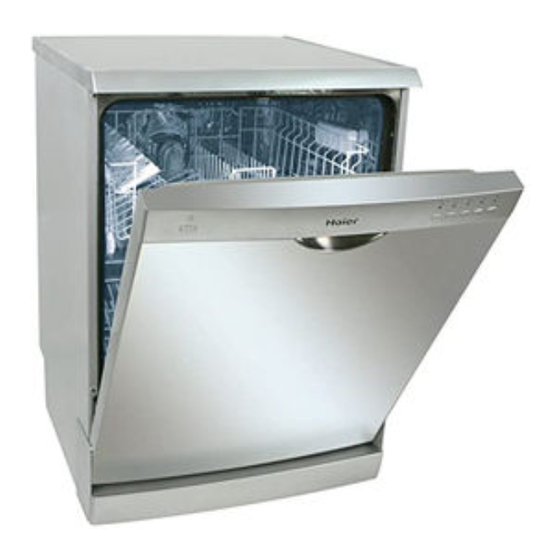
Haier DW12-PFE1S Instructions For Use Manual
User manual
Hide thumbs
Also See for DW12-PFE1S:
- Instructions for use manual (12 pages) ,
- Instructions for use manual (12 pages)
Table of Contents
Advertisement
Quick Links
Advertisement
Table of Contents

Summary of Contents for Haier DW12-PFE1S
- Page 1 Dishwasher DW12-PFE1 DW12-PFE1S DW12-PFE1ME DW12-PFE1SS Instructions for Use...
-
Page 2: Table Of Contents
Index Safety information Installation Getting to know your dishwasher How to fill the salt How to fill rinse aid How to fill the detergent dispenser Not suitable for the dishwasher Arranging crockery, glasses, etc. in the dishwasher Programme overview Care and maintenance Washing dishes How to keep your dishwasher in shape Fault finding... -
Page 3: Safety Information
Safety information At time of delivery If your family includes children Check packaging and dishwasher immediately for signs of transport damage. The appliance is not intended for use by young children or infirm persons If the appliance is damaged, do not put it into use but contact your supplier without supervision. -
Page 4: Installation
Installation Positioning the appliance Drain hose connection Insert the drain hose into a drain pipe with a minimum diameter of 4cm, or let it Positioning the appliance in the desired location. The back should rest against run into the sink, making sure to avoid bending or crimping it. If necessary, fit a the wall behind it, and the sides, along the adjacent cabinets or wall. -
Page 5: Getting To Know Your Dishwasher
Getting to know your dishwasher Close-up view (control panel) Dishwasher interior Programme Indicator ON-OFF Button Programme Button Upper Rack Salt Container Cap Lower Rack Washing Filter Detergent and Rinse Aid Dispenser Top Spray Arm Knife Rack Water Inlet Hose Drain Hose Silverware Basket Power Supply Cord Bottom Spray Arm... -
Page 6: How To Fill Rinse Aid
How to fill rinse aid Rinse aid Loading the rinse aid This product makes dishes sparkle and helps them to dry without spotting. The Regardless of the type of detergent dispenser installed on your appliance, you dispenser is located on the inside panel of the door . must proceed as indicated below when loading the rinse aid. -
Page 7: Arranging Crockery, Glasses, Etc. In The Dishwasher
Arranging crockery, glasses, etc. in the dishwasher Before placing the dishes in the dishwasher, remove larger food particles to How to use the upper rack prevent the filter from becoming clogged, which results in reduced performance. The upper rack is designed to hold more delicate and lighter dishware, such as If the pots and pans have baked-on food that is extremely hard to remove, we glasses, cups and saucers, plates, small bowls and shallow pans (as long as recommend that they are soaked before washed. -
Page 8: Programme Overview
Programme overview Type of Detergent Energy Water crokery Condi- Duration Wash Type of Rinse Amount consu- consu- e.g.china, tion of Exten- progra- food of food Description of cycle Pre- pots/pans, mption mption food minutes remains cutiery, remains remains wash in kWh in litres Wash glasses,... -
Page 9: Washing Dishes
Washing dishes End of programme Programme selection Six beeps will indicate that the wash cycle has finished and all the programme The most appropriate programme can be identified by comparing the type of indicators light. crockery, cutlery, etc., as well as the amount and condition of food remains, with the details contained in the wash cycle table.The corresponding programme Switching the dishwasher OFF sequence, duration and consumption details are shown in the right half of the... -
Page 10: Fault Finding
Fault finding Resolving minor problems yourself Experience has shown that you can resolve most problems that rise during the nature of the problem. normal daily usage yourself, without having to call out a service engineer.Not the model type number (Mod...) And the serial number (S/N...), which are only does this save costs,but it also means that the appliance is available for indicated on the plate located on the side of the inner part of the door. -
Page 11: Important Information
Plastic items are discoloured Tea stains or traces of lipstick have not been completely removed Not enough detergent was added to dispenser. Detergent does not have a sufficient bleaching effect. Detergent has insuffcient bleaching properties. Use a detergent containing a Washing temperature was set too low. -
Page 12: Technical Data
Technical data Mains water pressure 0.03-0.6MPa 60 cm Width Power voltage 220-240V~ 50Hz Depth 60 cm Height Maximum current intensity 85 cm Capacity 12 standard place settings 1950W Total absorbed power A: Wiring box F: Softener valve K: Heater B: Door switch G: Overflow switch L: Relay M: T 50...






Need help?
Do you have a question about the DW12-PFE1S and is the answer not in the manual?
Questions and answers